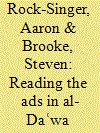|
|
|
Sort Order |
|
|
|
Items / Page
|
|
|
|
|
|
|
| Srl | Item |
| 1 |
ID:
145667


|
|
|
|
|
| Summary/Abstract |
In the Western political science literature of the late 20th and early 21st century, the Middle East has often been described, not only as authoritarian, but also as impervious to democracy. Institutional, structural, and cultural explanations were advanced to explain this democracy deficit. This article will debunk the notion that democratization in the Middle East is limited by entrenched Muslim and/or Islamist views on social and sexual mores, and on women’s political and social rights. Indeed, the events of the so-called “Arab Spring” have shown that the desire for democracy is the reason for the overthrow of several regimes in the Arab world. These popular-led regime changes were triggered by a desire for political and social reform. The main actors behind the Arab uprisings have been Arab youths and women, with women actively participating in anti-regime demonstrations and sometimes paying the price for that participation with their bodies. Using examples mainly from North Africa, the article will show three trends that have emerged in the region since the 1990s: changes in the law proposed by grassroots secular activists, the work of Muslim feminists, and that of Islamist female activists in the transformation of women’s roles in the Middle East that counter the claim that Islamic views on gender equality limit the emergence of democracy.
|
|
|
|
|
|
|
|
|
|
|
|
|
|
|
|
| 2 |
ID:
176559


|
|
|
|
|
| Summary/Abstract |
This article probes the return of the Muslim Brotherhood to prominence in 1970s Egypt through a systematic analysis of advertisements in the organization’s flagship periodical, al-Daʿwa (The Call). In every issue of the magazine, which was published between June 1976 and October 1981, entreaties to proper conduct and appeals to Islamic solidarity appeared alongside advertisements for everything from Pepsi to breakfast biscuits to automobiles. We utilize the methodological insights of social and cultural historians to the value of advertisements to cast new light on the reconstruction of the Brotherhood, its relationship with the diverse institutions comprising the Egyptian state, and on how the Muslim Brotherhood’s vision of piety both reflected and challenged a changing economic reality. Moving beyond a story of the Brotherhood’s return as a product of independent Islamist enterprise that had emerged due to both the Gulf oil boom and Egypt’s economic liberalization programme, significant public sector advertising in al-Daʿwa, especially prominent across the most valuable advertising real estate, underscores both internal divisions within the Egyptian state as well as the tangible ways that various state institutions were patrons of religious change.
|
|
|
|
|
|
|
|
|
|
|
|
|
|
|
|
| 3 |
ID:
151848


|
|
|
|
|
| Summary/Abstract |
In this article, I contribute to ongoing debates regarding proper conceptions of ‘political Islam’ or ‘Islamism’ by bringing greater attention to the roles that Islamic mysticism, or Sufism, have played in some traditions of Islamist thought and practice. I do so by situating the ‘commanding right and forbidding wrong’ discourse in the wider thought of ʿdeb al-Salam Yassine (d. 2012), founder of the Moroccan Justice and Benevolence Association (Jamaʿat al-ʿAdl wal-Ihsan). This discourse has been interpreted and deployed in various ways by Islamist movements to conceptualize their activist visions, and in the hands of Yassine, we find an understanding which has been thoroughly shaped by Sufism, especially in the role played by spiritual and ethical formation (tarbiya) in cultivating a successful socio-political vanguard. This perspective challenges analytical frameworks which describe Islamist groups primarily as products of modernity or as political ideologies. Additionally, attention to the Sufi-centric aspects of some traditions of Islamism offers a contrast to previous scholarship which has focused almost exclusively on its exoteric scripturalism and fixation on the law. Such insights are crucial when attempting to understand and engage Islamist actors for purposes ranging from cross-cultural understanding to policy formulation.
|
|
|
|
|
|
|
|
|
|
|
|
|
|
|
|
|
|
|
|
|